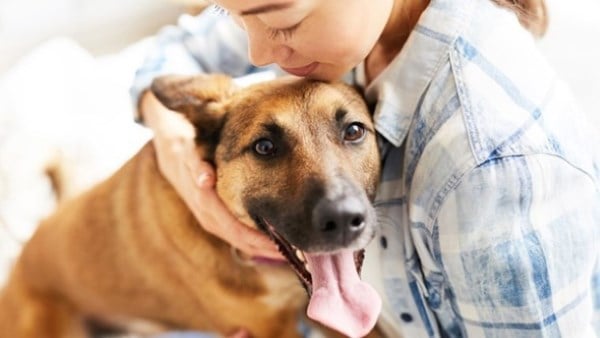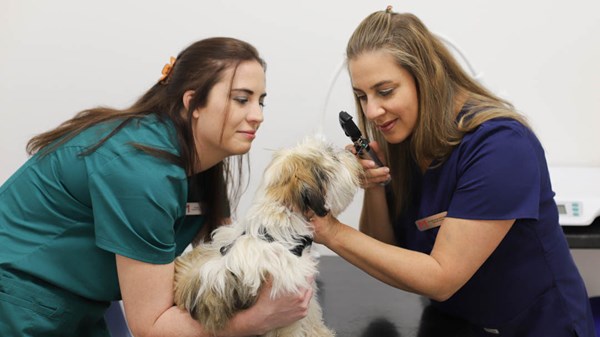Information On Neutering Your Dog
Neutering your dog brings a host of health benefits, and is the only way to prevent unwanted pregnancies. Find out more about what’s involved in neutering your dog.

What is neutering and spaying?
Neutering is the process of preventing dogs from reproducing. The simple, safe procedure is called castration in males and spaying in females.
Both operations are carried out under general anaesthetic and have minimal side effects.
Benefits of neutering dogs
There are many health and social reasons why neutering can be a good idea for both male and female dogs.
Benefits of neutering male dogs
- Neutering your male dog significantly reduces the risk of prostate disease and testicular cancer
- Castration can also have a positive effect on your dog’s behaviour by removing the main source of testosterone. This hormone can contribute or undesirable behaviours, including scent-marking and mounting
Benefits of spaying for female dogs
- Spaying your dog reduces the risk of developing breast cancer and prevents a fatal womb infection called pyometra
- Female dogs come into season twice a year for three weeks at a time. This can be messy and often attracts a stream of hopeful male dogs looking to mate. Spaying your dog eliminates the issue as well as the threat of unwanted pregnancy, which can be risky and expensive
- Many unneutered (or “intact”) dogs can experience a false pregnancy which can cause behavioural and medical problems
Do I need to neuter my dog?
Ultimately, the decision to neuter your dog is completely up to you and the needs of your dog. Although rare, any surgical procedure carries a degree of risk. Your vet will be happy to advise you on the best choice for your dog.

Do dogs change after being neutered?
Although certain hormone-led behaviours may decrease in younger animals, i.e. mounting and marking, your dog’s personality won’t change after neutering.
Types of neutering
In a standard castration procedure, the testicles are removed, which takes away the main source of the male hormone testosterone. This results in the male being unable to reproduce.
There are other alternatives to a traditional castration, including chemical castration (which uses medication to disrupt the production of testosterone) and a vasectomy (which leaves the testicles intact but removes the ability to reproduce). However, these aren’t common in dogs and aren’t recommended over the standard method.
The standard spay operation involves the complete removal of the ovaries and uterus, making her unable to become pregnant.
For female dogs, a laparoscopic, or keyhole, spay is a modern alternative to the traditional method and only removes the ovaries. This is a less invasive operation, requiring only a small incision and a shorter healing time. It also causes less pain than a standard procedure and minimises the risk of complications. Keyhole spays require specialist equipment and training and can be more expensive than the standard spay.
*Please note that not all of our practices offer a laparoscopic spay. If you require any further information please speak to a member of the team.

How long does it take to recover?
Dogs usually recover fairly quickly after they’ve been neutered. Pain-relief is given to help your dog feel as comfortable as possible, and most dogs are back on their feet within a few hours.
It typically takes less than 10 days for the incision to heal if it’s kept clean and your dog can’t lick it.
At what age should your pet be neutered?
Female dogs can be spayed from around six months old. Male dogs can be neutered from six to seven months old.
It’s always a good idea to check with your vet when the best time to neuter your pet is, as the best time to make a decision can depend on your dogs breed.

Book A Neutering Appointment
Find your local Medivet practice and book an appointment to neuter your dog.
Find a practice
Our Healthcare Plans For Your Dog
With the Medivet Healthcare Plan, you can save an average of £285 each year and that’s without discounts that the plan offers on top.
Learn moreRelated Articles

Heart Disease In Dogs
Heart disease affects up to 15% of dogs. Find out more about the signs & symptoms of heart disease in dogs.
Read article
The Responsible Dog Owner's Guide
Owning a dog is a huge commitment. Refresh your knowledge of responsible dog ownership with our complete guide.
Read article
The Importance Of Preventative Care
Vaccines, boosters and medical checks are important for maintaining your pet's health.
Read article
